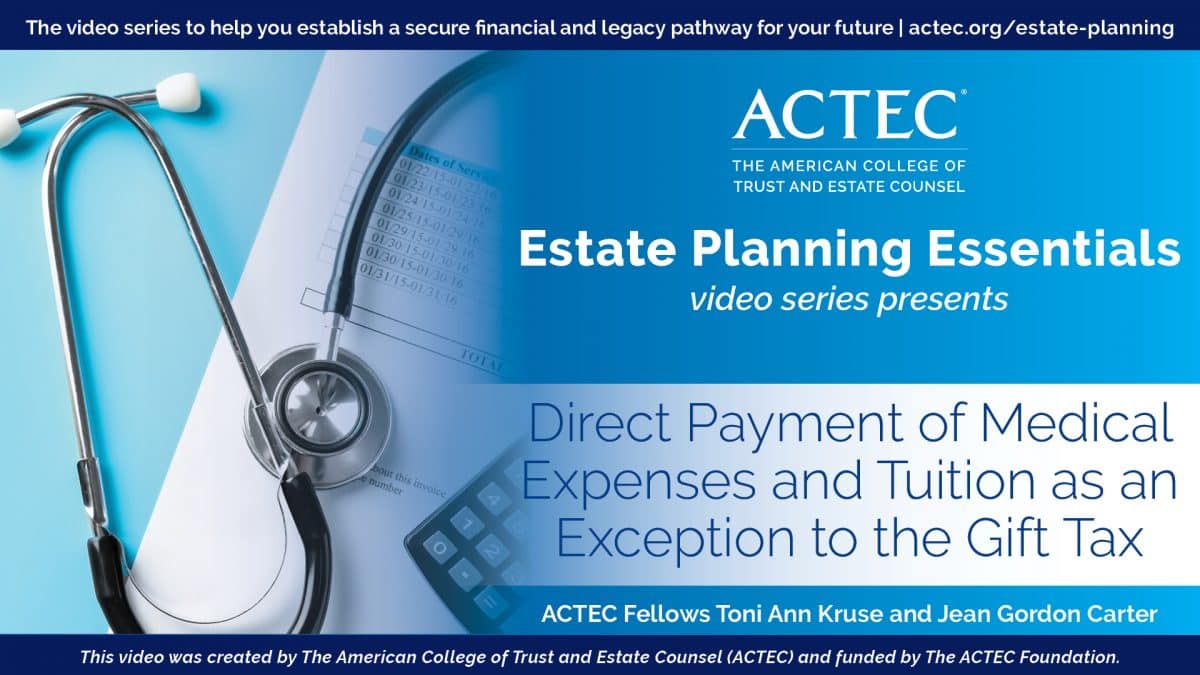Portability of estate and gift tax allows a surviving spouse to inherit any unused portion of their deceased spouse’s estate and gift tax exemption. This means that if one spouse doesn’t use up their full exemption, the surviving spouse can effectively double their exemption amount when it comes to their estate tax liability.
ACTEC Fellows Jean Gordon Carter and Stephen W. Murphy discuss the ins and outs of portability, its flexibility and limitations, and what to consider before electing to use it.
Transcript
I’m Jean Carter, an ACTEC Fellow from Raleigh, North Carolina. With me is Steve Murphy, an ACTEC Fellow from Charlottesville, Virginia and our topic today is portability.
Let’s start it off, Steve. What is portability?
Hi Jean. Thanks for having me. Simply put, portability is a way for spouses to combine their exemption from estate and gift tax. More specifically, it’s a process where a surviving spouse can pick up and use the unused estate tax exemption of a deceased spouse. So then, the surviving spouse has both his or her own exemption from estate and gift tax but also, the unused exemption of the deceased spouse.
Jean Carter: That sounds very useful. Steve, why don’t you give us a little background on the estate tax and how portability fits into that?
Steve Murphy: Yeah, sure. So, there is a federal gift and estate tax and it applies to transfers during life and upon death. Every individual has an exemption from gift and estate tax that they can apply to transfers. Currently, that exemption is $11.7 million per person. It is historically very high. And as someone makes gifts during life and upon death, they start to use that exemption. But some transfers don’t use any exemption. An example of that is a gift upon death, or during life, to a US citizen spouse or certain trusts for his or her benefit. So, the concern might be if one spouse passes away and leaves all the assets outright to the surviving spouse, and the deceased spouse hasn’t used any of his or her exemption. Now, the surviving spouse has all the assets in his or her estate; it might trigger estate tax upon his or her death, but the surviving spouse only has the surviving spouse’s exemption. What portability allows the surviving spouse to do is to pick up and use that unused exemption of the deceased spouse. So again, now the surviving spouse has these assets in his or her estate but can shelter them from estate and gift tax through his or her own exemption and also the unused exemption of the deceased spouse.
Jean Carter: Well, portability sounds very useful. How does one get portability?
Steve Murphy: A great question. Importantly, portability is not automatic. In order for the surviving spouse to pick up and use the unused exemption of the deceased spouse, the deceased spouse’s estate has to file a federal estate tax return that makes an election to allow the surviving spouse to use that exemption. Now that estate tax return is due within nine months of the deceased spouse’s death. There are some ways to get an extension of time but, as you can see, it’s important that the deceased spouse’s estate takes the steps to allow the surviving spouse to use this exemption.
Jean Carter: You’ve said a little bit already, but what are the advantages of portability?
Steve Murphy: The key advantage of portability is flexibility. It allows the spouses to go about their estate planning and transfer assets upon their death the way that they would like to, to carry out their wishes. And then, after one spouse’s death, then the surviving spouse can take steps to combine their estate tax exemptions to reduce estate tax.
Jean Carter: Very good. Are there times when someone would not want to elect portability?
Steve Murphy: Great question. The question with the estate tax exemption being so high there are many individuals to whom estate tax is simply not a concern or estate tax won’t apply. One concern about electing portability is the cost. Again, to elect portability the deceased spouse’s estate has to file an estate tax return and, if that isn’t otherwise required, that introduces some complexity and some cost into that process. So, this is a discussion you can have with the family to make sure they understand the cost and the potential benefits of portability and they can make the right decision of whether or not to make that election.
Jean Carter: That sounds good. Are there any limitations on portability?
Steve Murphy: Yeah, there are a couple of important limitations to portability. One is that many states have a state estate tax and, in many of those states, portability is not available for that state estate tax exemption. So if you’re in a state where this type of state estate tax would apply, maybe there still needs to be some estate tax planning for both spouses. And also, another concern is many clients might rely too much on portability. They might assume that the surviving spouse and the estate will take these steps, but that might lead everyone to have all the assets in the surviving spouse’s estate but if they haven’t properly elected portability, that could trigger estate tax.
Lastly, one important limitation on portability is that it only applies to the estate and gift tax exemption. There’s another important exemption from generation skipping transfer tax, or GST tax, and that is an exemption that allows transfers to grandchildren, and further descendants, without that additional GST tax or gift and estate tax. GST tax exemption is not portable between spouses. If spouses want to do some long-term planning with these types of assets, then they may need to rely not just on portability but other planning options. And one additional limitation is that you are only allowed to use the unused estate tax exemption of your last deceased spouse. So, someone could not simply remarry constantly and keep accumulating large amounts of exemption but, there are ways for individuals who marry successfully to use the exemption of their last deceased spouse, again to combine their estate tax exemption.
Jean Carter: Steve, this has been very helpful. Do you have any final comments?
Steve Murphy: The big takeaway I think, for portability is it gives clients a great amount of flexibility. It really used to be the case that, upon one spouse’s death, you had to use that estate tax exemption otherwise, you would lose it, and so clients would be led to set up trusts or take other steps during life and upon death to make sure that estate tax exemption was used. But now, those spouses have a great amount of flexibility and we can discuss with clients what are their goals for the assets upon one spouse’s death and then we can introduce other concepts of how to use portability and reduce estate tax at the death of one or both spouses. But, as you can see, with portability estate tax really no longer drives that conversation.
Jean Carter: This is great. Steve, thank you for your time today. Thank you.
Featured Video
Direct Payment of Medical Expenses and Tuition as an Exception to the Gift Tax
Learn the dos and don’ts of paying another person’s tuition or medical bills, what qualifies as tuition and medical expenses, and how to avoid gift tax.
ACTEC Estate Planning Essentials

ACTEC Fellows provide answers to frequently asked trust and estate planning questions in this video series.



